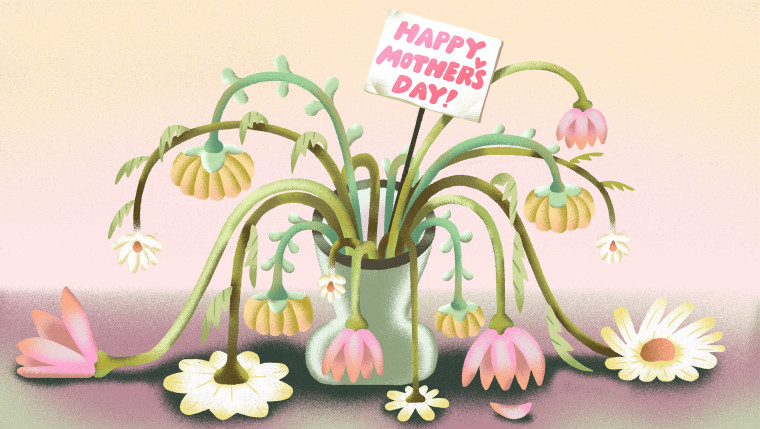I hate Mother's Day. I've hated it as a daughter, a daughter-in-law and a mother, and not because I don’t love the women it purports to honor.
I’m not saying don’t honor mothers. But I am saying we shouldn’t do it in the threadbare fashion we have pursued for more than a century.
It’s just that the day has always seemed to be merely an excuse for Sunday brunches that are inevitably loud, crowded and overflowing with bad food; a celebration that is a boon for florists, Hallmark and the makers of small kitchen appliances, but not mothers themselves.
After the year we’ve all experienced, to treat Mother’s Day the way we always have seems particularly insensitive. Mothers have held us together this year, even more than they normally do, and too many of them have struggled without much support from the larger community. This should no longer be a day when individual families offer tokens to the mothers in their lives. It should have a bigger, more inclusive meaning.
I've always thought that punctuation is important, and in the history of this holiday, it really matters. In 1858, Ann Reeves Jarvis organized a Mothers’ Day Work Club to educate women on practices that could reduce infant mortality. The cause was personal to her: She’d given birth to 13 children, and only four had survived to adulthood. Later, she promoted a Mothers’ Friendship Day to help bring together veterans of both sides of the Civil War.
Her daughter Anna Jarvis, however, didn’t have the larger community in mind when she sought popular support to adapt her mother’s practice into a day of homage to individual mothers, which became a national holiday in 1914. She called it Mother’s Day, not Mothers’ Day.
During the Great Depression, the younger Jarvis even opposed efforts to use Mother’s Day to raise funds to actually help mothers in need. (She also condemned its growing commercialism, a fight that became a lifelong obsession and which she clearly lost.)
The placement of that little apostrophe reinforces this distinctively American view of how society should function: Families are supposed to be self-sufficient, and it is up to mothers to ensure their wholeness and integrity.
Generations later, while many of the world’s richest nations have offered paid maternity leave and more affordable child care, families in this country have been basically on their own.
It wasn’t until the pandemic hit that many policymakers appeared to notice that things weren’t working too well. After all, about a quarter of America’s children live in single-parent families, 80 percent of them headed by women. In September alone, more than 850,000 women left the workforce, many of them overwhelmed by child care and other domestic tasks. That was four times the number of men who left their jobs that month.
I’m not saying don’t honor mothers. But I am saying we shouldn’t do it in the threadbare fashion we have pursued for more than a century. Mothers don’t need more blenders or breadmakers or greasy scrambled eggs. They need a lot more help.
Even under the rosiest political scenarios, that’s not going to happen overnight. What might be a step in the right direction is an effort to change the culture of Mother’s Day: Make it less focused on individual families and tributes to specific mothers, and more about communities recognizing the mothers in their midst.
While Mother’s Day American-style has spread to some countries, in others there’s a larger, community-focused dimension to the celebration. In the U.K., for instance, there’s a historical and liturgical link to Mothering Sunday, the fourth Sunday in Lent and a day when Lenten restrictions were relaxed and desserts were permitted. In Elizabethan times, servants even got the chance to visit their own families.
In Thailand, honoring mothers is part of a festival observing the birthday of the queen, and includes parades and the gift of jasmine flowers to all moms.
And then there’s Italy. My spouse and I happened to be in Sorrento in 2010 on the big day. The observance was far different from what I’d experienced stateside.
It began with a concert the evening before, the entire town’s celebration of all its mothers. Sorrento’s mayor spoke, welcoming the crowd. The local pastor put in an appearance. Since the venue was a church, the repertoire was dedicated to Mary, the mother of Jesus.
A formally dressed chamber ensemble, complete with two soloists, took their places. The music, exquisitely performed before an appreciative audience, included the classical world’s finest tributes to Mary. The concert concluded with a very modern Ave Maria by Argentinian tango composer Astor Piazzolla.
I've always thought that punctuation is important, and in the history of this holiday, it really matters.
As the mothers left, all of them — me included — received small heart-shaped candy boxes filled with chocolates and one red rose.
On Mother’s Day itself, Sorrento’s chubby grandmothers, their sleek and sexy daughters and their small grandchildren visited the town’s tiny beach. They laughed and chatted as the little ones played in the pebbly sand. It seemed so relaxed and low-key.
During a year that taxed American mothers in so many ways, maybe the Italian expression of gratitude would be more fitting. All mothers deserve fewer brunches and appliances, and more days at the beach.



